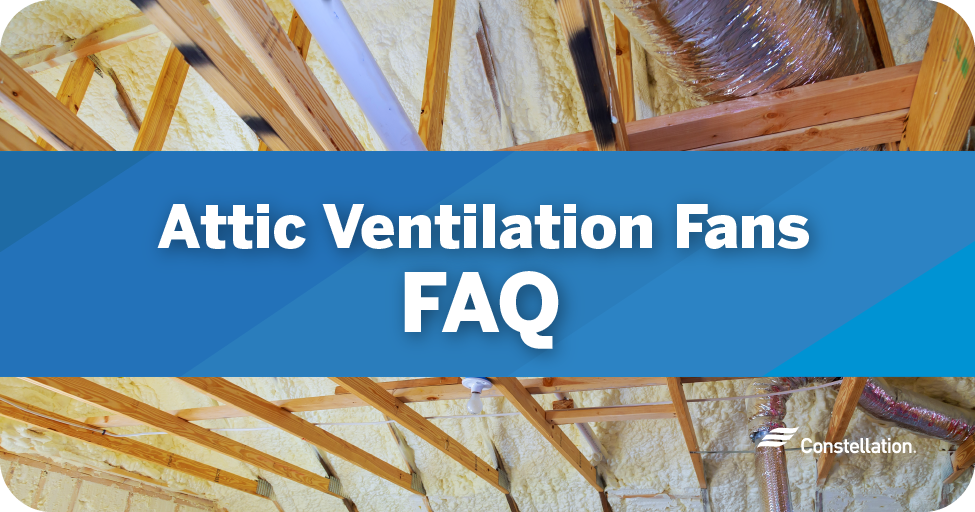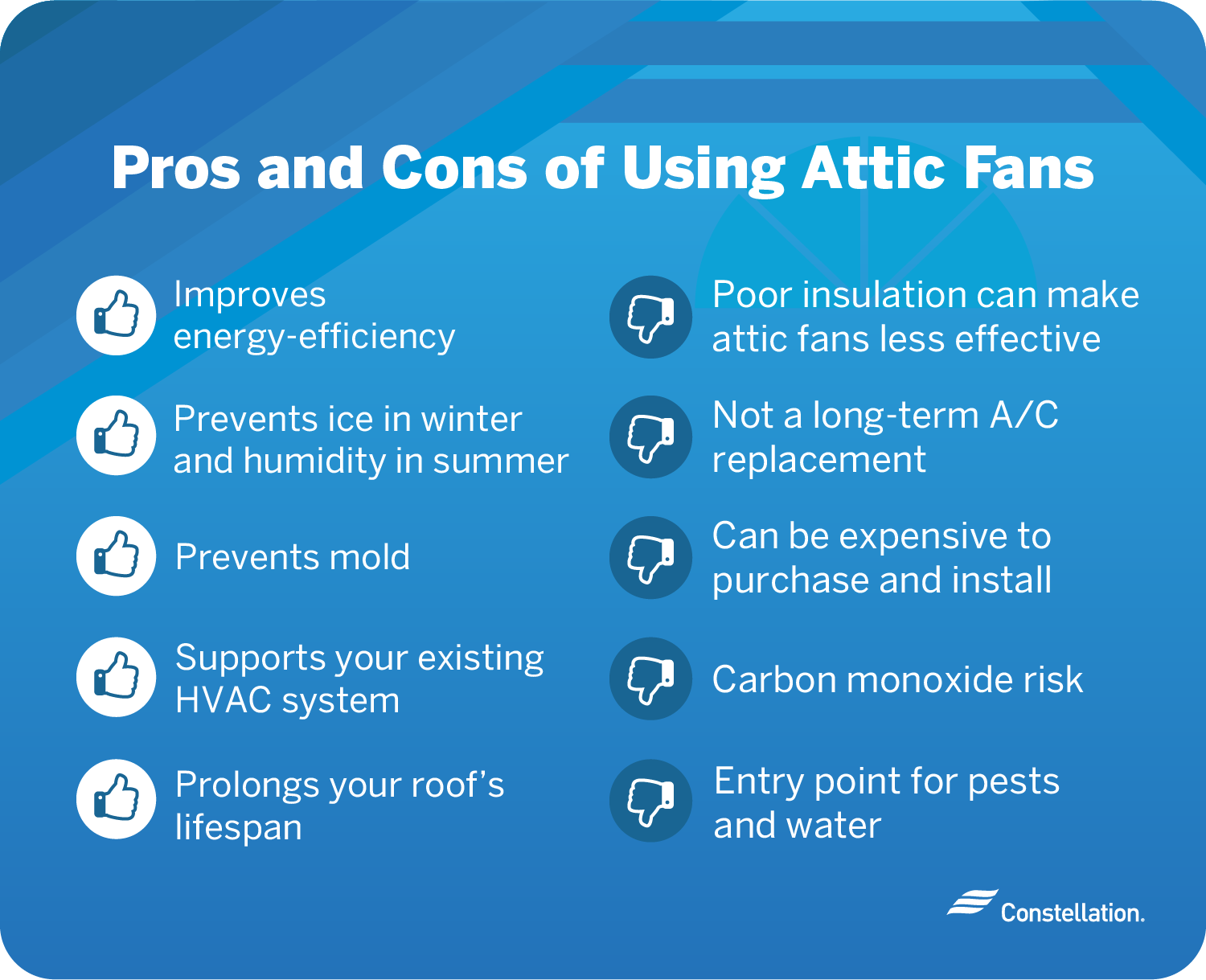
- Category:
Energy Efficiency -
Last updated:
February 10, 2022
Attic Ventilation Fans FAQ
If you have questions about attic ventilation fans, we have answers. Attic fans are something to consider if you are looking for more energy efficient ways to keep your house cool in the summer and warm in the winter. Many people wonder: Do attic fans really work? What does an attic fan do? And finally, how does an attic fan work? We’ll take a deep dive on attic ventilation fans pros and cons so that you can decide for yourself: Are attic fans worth it?
How does an attic fan work, and what does it do?
An attic fan is a device installed above your living space yet under your roof that pulls air out of the space. It draws hot, moist air out of your attic and creates a slight vacuum effect that brings fresh, cool air up from your basement and lower floors through your house.
Not only are you getting rid of air that can breed molds and harbor allergens and disease-causing microorganisms, but you are also helping your HVAC system operate more efficiently.
In the summer, your attic temperature may climb to levels hot enough for cooking–exceeding 160 degrees. Venting this hot air out of your attic and drawing up the cool air affects the temperature of your whole house, especially your living spaces.
Compared to your HVAC system, fans may use less energy. Adding attic ventilation fans, along with other energy-efficient fans like window and ceiling fans, can create an efficient cooling system in your home.
Does an attic fan help your air conditioning unit?
Attic fans work with your HVAC system by venting humidity–which makes hot air feel even more stifling–out of your attic. The benefit is more than removing hot air from the attic. It also circulates air-conditioned air throughout the house for a more even temperature in all the rooms. Cool air is heavier than hot air, so you might find your first floor is chilly while your bedrooms upstairs are too warm for comfort. An attic fan moves that cool air up and through the house as it vents out the hot air. Attic fans can work even better when you have good attic insulation.
If your HVAC breaks down, you can use your attic fan to try and reduce temperatures in your house. In the cool of the evening, open your first floor windows and the door to your basement if you have one. Running the attic fan will draw this cool air up and into your living spaces, potentially dropping the temperature significantly. When the day heats up, close the windows, but leave the basement door open. It is one of the ways to keep your house cool without A/C or if you want to attempt reducing your A/C usage in the summer.
Pros and cons of attic ventilation fans
Attic fans really do work, but the pros and cons of attic ventilation fans are worth considering. On the one hand, attic fans may improve ventilation and lower temperatures. On the other, attic ventilation fans can be pricey, costing between $200 to about $1,300. Consider your overall energy consumption as you look to heat and cool your attic more efficiently. They could consume more energy than they save without proper insulation. Also compare them with energy-efficient whole-house fans.

Attic fan pros
When determining if attic fans are worth it, here are the major arguments for making an investment in attic ventilation fans.
- Could improve energy efficiency. By removing hot air and circulating air-conditioned air, an attic fan may improve the energy efficiency of your HVAC system.
- Prevents ice in winter and humidity in summer. When hot air builds up in your attic in the winter, it can melt the snow on your roof that then refreezes, causing damage to your roof. In the summer, the warm moist air builds up, creating its own set of problems.
- Prevent mold. Hot moist air in a dark environment sets up the perfect conditions for mold growth, which can damage your home and create health problems.
- Supports your existing HVAC system. Your HVAC doesn’t have to do all the heavy lifting with a boost from your attic fans that remove heat and humidity as they circulate cooled air evenly through your home.
- Prolongs your roof’s lifespan. Heat trapped in your attic stresses your roof, aging its components, and, in the case of ice, damaging the integrity of your roof system.
Attic fan cons
While there are strong arguments to be made for installing attic ventilation fans, they also have some drawbacks.
- Poor insulation may make attic fans less effective. If you don’t have good attic insulation, you may not get the efficiency benefits you seek.
- Not a long-term A/C replacement. While attic fans can help keep your home cool, they can’t do as well as your air conditioner. You will want to keep your HVAC running at peak performance. Here are some tips to fix your A/C.
- Can be expensive to purchase and install. You will want to balance the energy savings you might gain against the cost of buying and putting in attic ventilation fans.
- Carbon monoxide risk. If you have a carbon monoxide leak in any of your appliances, attic fans can quickly spread this dangerous gas. Be sure to install carbon monoxide detectors at critical locations around your home, particularly in bedrooms.
- Entry point for pests and water. Adding vents, if not done well, can create additional points for water to leak in and pests to enter your home.
Are attic fans worth it?
The answer to that question isn’t cut and dry. Different types of houses, HVAC systems and even climates affect the efficiency and potential benefits of attic ventilation fans. For instance, if your home has continuous unobstructed soffit venting and a well-design ridge vent, you might not need an attic fan. In moderate climates, you may not get enough benefit to make the cost and effort worth it. When it comes to energy efficiency, you might consider powering your attic fans with solar. In any case, each situation is different. Now that you have answers about how an attic fan works and what it can do, you can make a solid evaluation of whether attic fans are worth it for you.




